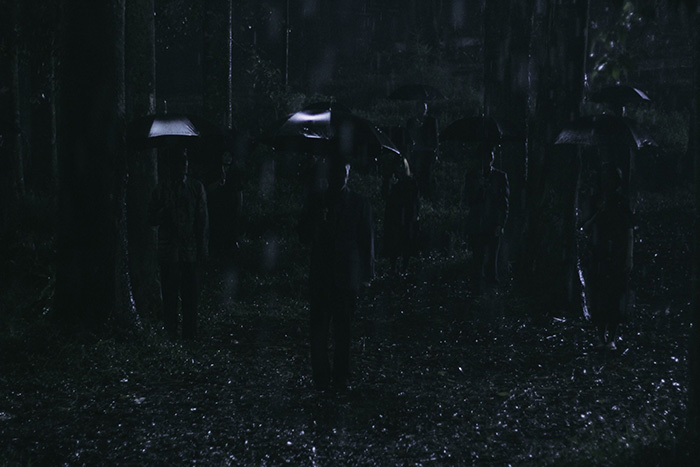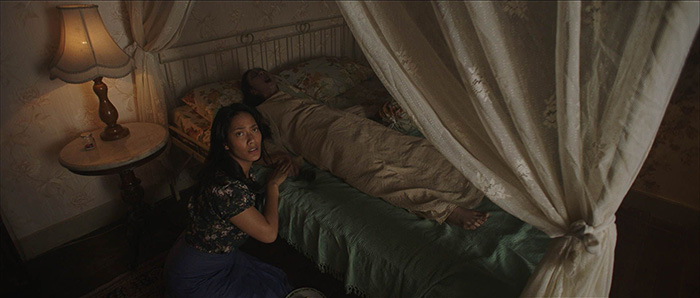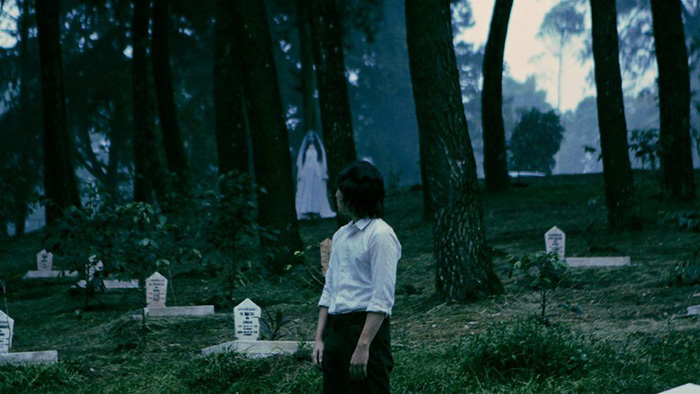It wasn’t until 2006 that cult Indonesian horror film Satan’s Slave finally received a DVD pressing after accruing its mystique without subtitles courtesy of a Japanese VHS. The 1980 release from director Sisworo Gautama Putra has been called an unofficial remake of Don Coscarelli’s Phantasm, its supernatural haunting steeped in Muslim beliefs and Indonesian folklore rather than the usual Christian trappings associated with the Devil. The pedigree it holds therefore made it unsurprising that Joko Anwar (who grew up on genre fare spanning horror to kung fu) would seek to helm a remake. It may have taken more than ten years to turn that dream into a reality, but Satan’s Slaves becoming his nation’s best-selling domestic release ever proves it was worth the wait.

The 1981-set movie begins with an older woman chanting under her breath in bed, an obvious sickness having taken control of her body three years previously. By this time the famous singer and mother of four (Ayu Laksmi’s Mawarni Suwono) has seen her music royalties disappear and her family forced to move-in with her mother-in-law (Elly D. Luthan’s Rahma) inside a large home located within the rural outskirts of Jakarta. Money is therefore tight as medical bills pile up. Mawarni’s husband (Bront Palarae) is doing all he can to make ends meet while their daughter Rini (Tara Basro) quits college to stay and watch over everyone: namely her and Tony’s (Endy Arfian) youngest siblings Bondi (Nasar Annuz) and hearing-impaired Ian (M. Adhiyat). The stress has consumed them all.
Fear has taken hold too with strange visions and dreams populating the kids’ minds, each as much a foreshadowing of future terror and foreboding towards their mother’s inevitable demise. It isn’t longer after her funeral that a white veiled ghost in her image is seen skulking around their property. Local imam Ustad’s (Arswendi Nasution) son Hendra (Dimas Aditya) isn’t one to disbelieve his eyes and little Bondi can’t help screaming each night as something threatens to take control over his agency. Eventually their father goes to the city for an unknown period of time, leaving Rini and Tony defenseless as they confront a troubled, cultish past they’ll soon learn is documented within a trashy magazine article written by the hand of their grandmother’s old friend Budiman (Egy Fedly).

If this man’s words are to be believed, Mawarni made a pact with a fertility cult long ago wherein the price of motherhood was the sacrifice of her youngest child to Satan on his/her seventh birthday. The catch, however, is that those disciples couldn’t simply take their prize. The family had to willingly give him/her up — the ritual acceptance of the agreement seemingly as important as the victim. So Rini and the boys must make sure to hold their love for each other as paramount to everything that’s happening. If they stick together they can fend off the pursuit of so-called “shepherds” coming in the dead of night to claim their soul. But as they’ll soon discover, spirits inside the house are already planting seeds for a fight.
Comparisons to James Wan’s The Conjuring series are well-earned both due to its ghost story premise and its period detail. Many of the scares hold a striking resemblance too whether a painting finding physical form or the talon-hands of a jinn creeping under Rini’s prayer dress — everything seemingly done with practical effects for enhanced authenticity. I really like the way Anwar has made this family secular rather than religious, their lack of God and spirituality a doorway unwittingly left open to whatever demonic covenants Mawarni made. And when the children start uncovering more details thanks to Budiman’s insight, we learn that she may have had regrets. Her illness may have been Satan’s way of forcing her hand to finally give him what he was owed.

So there’s plenty to like as the package is very much attuned to the recent shift towards “art-house” horror happening in America. It isn’t necessarily a slow burn like A24’s releases, though. The usual tropes such as shadowy figures pouncing, heads rising to the surface of a well, and supernatural beings catching innocents in tractor beams of black magic are all present to provide a fresh, impactful haunting every evening. The deaths are crucial to the plot rather than excuses for graphic blood and gore, the contrast of good and evil often conflating as warnings get mistaken for danger. We never learn exactly how Budiman knows what he does — or why any revisions come when it’s almost too late — but the mythology grows more sinister each day.
Bondi becomes a vessel of sorts with Annuz proving suitably creepy while watching over his younger brother with dead, soulless eyes. Adhiyat’s Ian is perpetually joyous, his sign language accompanied by an infectious smile keeping hopes up despite dire circumstances. But it’s Arfian and Basro who carry the heaviest of loads as the “adults” positioned between life and death. His Tony is compassionate (the relationship with his mother heartbreakingly sweet) and open-minded while her Rini is pragmatic and cynical. Eventually, however, everything happening makes it so skepticism becomes a liability. Soon enough they’ll have to make a choice to end this nightmare before it consumes any more collateral damage. And as fans of the original realize this isn’t just a remake, they’ll understand evil is never completely defeated.
Satan’s Slaves is now playing the Fantasia International Film Festival.

